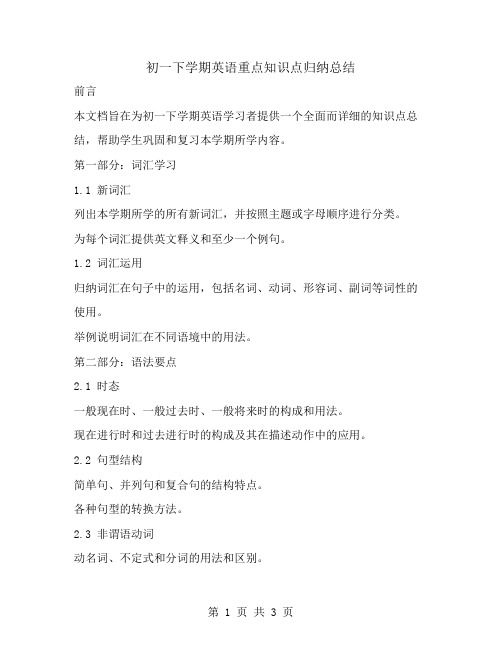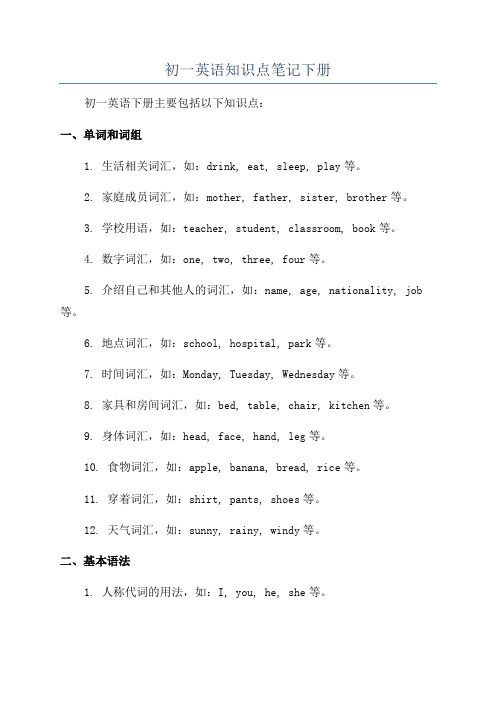初中一年级下学期英语笔记
初一英语知识点

初一英语知识点对于刚刚步入初中的同学们来说,初一英语是一个全新的起点。
掌握好初一英语的知识点,能够为后续的英语学习打下坚实的基础。
下面让我们一起来梳理一下初一英语的重要知识点。
一、词汇词汇是英语学习的基石。
初一英语的词汇量相较于小学有了明显的增加,不仅要记住单词的拼写和读音,还要理解其词义和用法。
1、名词包括人物、地点、物品等的名称。
例如:student(学生)、school (学校)、book(书)等。
要注意名词的单复数形式,如:apple(苹果)apples(苹果复数)。
2、动词表示动作或状态的词。
如:run(跑)、eat(吃)、sleep(睡觉)等。
动词有时态的变化,初一主要学习一般现在时、现在进行时等。
3、形容词用于描述或修饰名词。
比如:beautiful(美丽的)、big(大的)、small(小的)等。
4、副词用来修饰动词、形容词或其他副词。
像:quickly(快速地)、carefully(仔细地)、very(非常)等。
二、语法1、一般现在时表示经常发生的动作或存在的状态。
其结构为:主语+动词原形(当主语为第三人称单数时,动词要加“s”或“es”)。
例如:I play football every day(我每天踢足球。
)He likes music(他喜欢音乐。
)2、现在进行时表示正在进行的动作。
结构为:主语+ be 动词(am/is/are)+动词的现在分词。
例如:They are reading books now(他们现在正在读书。
)3、人称代词和物主代词人称代词有主格和宾格之分,主格用于作主语,宾格用于作宾语。
例如:I(主格) love you You love me(宾格)物主代词分为形容词性物主代词和名词性物主代词。
形容词性物主代词后面要接名词,如:my book(我的书);名词性物主代词相当于“形容词性物主代词+名词”,如:This is my book That is yours (yours 是名词性物主代词,相当于 your book)4、数词包括基数词和序数词。
(完整版)初中一年级英语语法总结

一、名词复数规则.1. 一般情况下, 直接加-s, 如: book-books.bag-bags.cat-cats.bed-beds.2. 以s.x.sh.ch结尾, 加-es, 如: bus-buses.box-boxes.brush-brushes.watch-watches .3. 以“辅音字母+y”结尾, 变y为i.再加-es, 如: family-families.strawberry-strawberries.4. 以“f或fe”结尾, 变f或fe为v.再加-es, 如: knife-knives.5. 不规则名词复数:.man-men.woman-women.policeman-policemen.policewoman-policewomen.mouse-mice.child-children.foot-feet,.tooth-teeth.fish-fish.people-people.Chinese-Chinese.Japanese-Japanese二、一般现在时.一般现在时基本用法介..【No.1】一般现在时的功能. 1.表示事物或人物的特征、状态。
如:Th.sk.i.blue.天空是蓝色的。
. 2.表示经常性或习惯性的动作。
如:.ge.u.a.si.ever.day.我每天六点起床。
. 3.表示客观现实。
如:Th.eart.goe.aroun.th.sun.地球绕着太阳转。
.一般现在时的构成. 1.be动词:主语+be(am,is,are)+其它。
如:..a..boy.我是一个男孩。
. 2.行为动词:主语+行为动词(+其它)。
如:.W.stud.English.我们学习英语。
.当主语为第三人称单数(he.she,it)时,要在动词后加"-s"或"-es"。
如:Mar.like.Chinese.玛丽喜欢汉语。
.一般现在时的变化. 1.be动词的变化。
初一英语知识点

初一英语知识点对于刚刚踏入初中阶段的同学们来说,初一英语是一个全新的开始,也是打下坚实基础的关键时期。
以下是一些重要的初一英语知识点。
一、词汇词汇是英语学习的基石。
初一阶段会接触到大量的基础词汇,包括名词、动词、形容词、副词、介词等。
例如,关于家庭的词汇:father(父亲)、mother(母亲)、sister (姐妹)、brother(兄弟)等;关于学校的词汇:classroom(教室)、teacher(老师)、student(学生)、desk(书桌)等。
记忆词汇的时候,可以通过多种方式,如制作单词卡片、结合例句记忆、运用联想等。
二、语法1、一般现在时这是初一英语中非常重要的一个时态,表示经常发生的动作或存在的状态。
其结构是:主语+动词原形/动词第三人称单数形式。
例如:I play basketball every day(我每天打篮球。
)He likes music(他喜欢音乐。
)需要注意主语是第三人称单数时,动词要发生相应的变化,如:have has;go goes 等。
2、人称代词和物主代词人称代词分为主格和宾格,主格在句子中作主语,宾格作宾语。
例如:I(主格) love you You love me(宾格)物主代词分为形容词性物主代词和名词性物主代词。
形容词性物主代词后要接名词,如:my book(我的书);名词性物主代词相当于“形容词性物主代词+名词”,如:This is my book That is yours(yours = your book)3、名词的单复数一般情况下,直接在名词后加 s 构成复数,如:book books;以 s, x, ch, sh 结尾的名词,加 es,如:box boxes;以辅音字母+ y 结尾的名词,把 y 变为 i 再加 es,如:family families。
三、句型1、 There be 句型表示“某处有某物”,There is +单数名词/不可数名词;There are +复数名词。
初一下学期英语重点知识点归纳总结

初一下学期英语重点知识点归纳总结前言本文档旨在为初一下学期英语学习者提供一个全面而详细的知识点总结,帮助学生巩固和复习本学期所学内容。
第一部分:词汇学习1.1 新词汇列出本学期所学的所有新词汇,并按照主题或字母顺序进行分类。
为每个词汇提供英文释义和至少一个例句。
1.2 词汇运用归纳词汇在句子中的运用,包括名词、动词、形容词、副词等词性的使用。
举例说明词汇在不同语境中的用法。
第二部分:语法要点2.1 时态一般现在时、一般过去时、一般将来时的构成和用法。
现在进行时和过去进行时的构成及其在描述动作中的应用。
2.2 句型结构简单句、并列句和复合句的结构特点。
各种句型的转换方法。
2.3 非谓语动词动名词、不定式和分词的用法和区别。
非谓语动词在句子中作不同成分的例句。
第三部分:阅读理解3.1 阅读技巧快速阅读和精读的技巧。
如何通过上下文推断词义。
3.2 文章类型描述性文章、叙事性文章、说明性文章和议论性文章的特点。
不同类型文章的阅读策略。
第四部分:写作技巧4.1 写作基础英语写作的基本步骤:构思、草拟、修改。
写作中的常见错误及其纠正。
4.2 写作类型记叙文、说明文、议论文的写作要点。
各类文章的写作模板和结构。
第五部分:听力理解5.1 听力技巧听力前的准备工作。
听力中的笔记技巧和信息捕捉。
5.2 听力材料不同类型的听力材料:对话、短文、新闻等。
针对不同材料的听力策略。
第六部分:口语表达6.1 口语基础发音、语调、节奏的练习方法。
常用口语表达和习语。
6.2 口语实践角色扮演、情景对话的练习。
公共演讲和辩论的技巧。
第七部分:综合运用7.1 跨文化交际英语国家文化习俗的介绍。
如何在交流中体现文化敏感性。
7.2 学习策略有效的英语学习方法和习惯。
时间管理和自我激励的技巧。
结语本总结旨在帮助学生系统地回顾和巩固初一下学期的英语学习内容,为下一学期的学习打下坚实的基础。
初一初中英语知识点总结

初一初中英语知识点总结一、词汇学习1. 基础词汇积累:初一英语学习首先需要积累基础词汇,包括日常生活用品、颜色、数字、食物、动物等常用词汇。
这些词汇是进行日常交流和理解简单句子的基础。
2. 词性辨识:学习并掌握名词、动词、形容词、副词、介词、连词等基本词性,了解不同词性在句子中的作用和位置。
3. 短语搭配:掌握常用的动词短语、介词短语和固定搭配,如“go shopping”,“in the morning”等,这些短语在口语和书面语中都非常常见。
二、语法知识1. 时态:初一英语需要掌握的时态包括一般现在时、一般过去时和一般将来时。
了解不同时态的构成和用法,能够正确地表达动作发生的时间。
2. 句型结构:学习简单句的五种基本句型,如主语+谓语、主语+谓语+宾语等,并能够根据这些句型构造简单句子。
3. 代词:学习人称代词、物主代词、指示代词、疑问代词等,并理解它们在句子中的用法和指代关系。
4. 形容词和副词:了解形容词和副词的用法,包括比较级和最高级的构成及其用法,能够在句子中正确使用形容词和副词进行描述和修饰。
5. 简单从句:学习使用简单的连词引导从句,如because, when, if 等,理解从句在句子中的作用和位置。
三、听力训练1. 听力材料选择:选择适合初一学生水平的听力材料,如英语儿歌、简短对话、小故事等,逐步提高听力理解能力。
2. 听力技巧:学习并运用预测、捕捉关键信息、理解上下文等听力技巧,提高听力效率。
3. 听力练习:定期进行听力练习,包括听写、回答问题、模仿发音等,加强听力训练。
四、口语表达1. 日常对话:练习日常生活中的基本对话,如问候、自我介绍、购物、问路等,提高口语交际能力。
2. 发音练习:注重英语发音的准确性,通过跟读、模仿等方式,纠正发音错误,提高语音语调的自然度。
3. 情景模拟:通过角色扮演、情景对话等方式,模拟真实交流场景,增强口语应变能力。
五、阅读理解1. 阅读材料选择:挑选适合初一学生阅读水平的材料,如简短故事、科普文章、漫画等,逐步提升阅读能力。
初一英语知识点笔记下册

初一英语知识点笔记下册初一英语下册知识点:1. 一般过去时:用来表示过去发生的动作或状态。
动词的一般过去时通常是在动词原形的基础上加上-ed,但也存在一些不规则动词,需要特殊记忆。
2. 数词的读法:基数词用来表示事物的数量,如one、two、three 等;序数词用来表示事物的顺序,如first、second、third等。
3. 颜色和形状的表达:学习常见的颜色和形状的英语表达,如red、yellow、blue等颜色,以及circle、triangle、square等形状。
4. 动词的ing形式和第三人称单数形式:动词的ing形式用来表示进行中的动作,如running、playing等;第三人称单数形式在动词原形的基础上加上-s或-es,如plays、reads等。
5. 英语时间表达:学习如何用英语表达时间,如on Monday、at 8o'clock等。
6. 情态动词can和may的用法:can表示能力,may表示许可,用于询问和提出请求。
7. 介词的用法:学习常见的介词及其用法,如in、on、at等。
8. 形容词和副词的比较级和最高级:学习形容词和副词的比较级和最高级的构成和用法,如taller、most interesting等。
9.祈使句:学习如何用祈使句表达命令和建议。
10. 连词的用法:学习常见的连词及其用法,如and、but、because 等。
11. 物主代词的用法:学习how to use物主代词,如mine、yours、hers等。
12.宾语从句:学习如何用宾语从句来扩展句子意思。
13. 简短回答和否定回答的表达:学习如何用yes或者no来回答问题。
14.祈使句的否定:学习如何用否定形式来表达否定的祈使句。
15. 一般疑问句的构成:学习如何用助动词或者be动词将陈述句转变为一般疑问句。
初一英语知识点笔记下册

初一英语知识点笔记下册初一英语下册主要包括以下知识点:一、单词和词组1. 生活相关词汇,如:drink, eat, sleep, play等。
2. 家庭成员词汇,如:mother, father, sister, brother等。
3. 学校用语,如:teacher, student, classroom, book等。
4. 数字词汇,如:one, two, three, four等。
5. 介绍自己和其他人的词汇,如:name, age, nationality, job 等。
6. 地点词汇,如:school, hospital, park等。
7. 时间词汇,如:Monday, Tuesday, Wednesday等。
8. 家具和房间词汇,如:bed, table, chair, kitchen等。
9. 身体词汇,如:head, face, hand, leg等。
10. 食物词汇,如:apple, banana, bread, rice等。
11. 穿着词汇,如:shirt, pants, shoes等。
12. 天气词汇,如:sunny, rainy, windy等。
二、基本语法1. 人称代词的用法,如:I, you, he, she等。
2. 一般现在时的肯定句和否定句,如:I eat breakfast every morning. I don't drink coffee.3. 一般过去时的肯定句和否定句,如:I went to the park yesterday. I didn't watch TV last night.4. 一般将来时的肯定句和否定句,如:I will go to the beach tomorrow. I won't play basketball this weekend.5. 疑问句的构成,如:Do you like ice cream? Did she finish her homework?6. 介词的用法,如:in, on, at等。
初一下册英语知识点汇总

初一下册英语知识点汇总一、语法知识点1. 现在进行时:描述正在进行的动作或状态,使用时用be动词加动词-ing形式。
例:I am reading a book.(我正在读一本书。
)2. 一般现在时:表示经常性或普遍性的动作或状态。
例:She goes to school every day.(她每天上学。
)3. 一般过去时:表示过去发生的动作或状态。
例:They visited their grandparents last week.(他们上周去看望了他们的祖父母。
)4. 一般将来时:表示将要发生的动作或状态。
例:We will have a party tomorrow.(我们明天要开一个派对。
)二、词汇知识点1. 问候语:用于问候和打招呼的常用表达。
例:Hello!(你好!)Nice to meet you!(很高兴见到你!)2. 数字:用于表示数量或顺序的数字词汇。
例:one(一), two(二), three(三), first(第一), second (第二), third(第三)3. 学科词汇:常用于描述科目和研究相关的单词。
例:math(数学), science(科学), geography(地理), history(历史)4. 动词:常用动作动词和状态动词。
例:run(跑), eat(吃), sleep(睡觉), happy(快乐)三、阅读技巧1. 理解词义:通过上下文推测词义,遇到生词时可以使用词根或词缀分析词义。
2. 关键词定位:快速浏览文章,找到与问题相关的关键词,通过定位关键词来找到答案。
3. 推理推断:从已有信息中推断答案,根据事实进行逻辑推理。
4. 主旨概括:准确理解文章的主旨,通过理解文章大意来回答问题。
四、听力技巧1. 注意听力材料:集中注意力,注意材料中的关键词和信息。
2. 笔记记录:听力过程中可以适当做笔记,帮助记忆和理解。
3. 推断答案:通过听到的信息和已有知识推断答案。
- 1、下载文档前请自行甄别文档内容的完整性,平台不提供额外的编辑、内容补充、找答案等附加服务。
- 2、"仅部分预览"的文档,不可在线预览部分如存在完整性等问题,可反馈申请退款(可完整预览的文档不适用该条件!)。
- 3、如文档侵犯您的权益,请联系客服反馈,我们会尽快为您处理(人工客服工作时间:9:00-18:30)。
作文范文My favourite movie star is Zhou xingchi.His English name is Stephen Chow.His birthday is in June 22nd.He is 33 years old now.He is from China.He lives in Hong Kong.He can speak Chinese and a little English.His favourite color is green.He likes swimming very much.His hobby is singing.He often sings songs with friends on weekends.But he can’t sing well.He has a brother and 3 sisters is his family.I like comedies and I like him very much.My favourite movie is Kung Fu.I think it is interesting.I think Stephen Chow is a successful actor.Unit 11. be from=come from 来自(有be动词不用come)e.g. I am from Dongguan=I come from Dongguan.Where are you from=Where do you come from?2. 某过人的复数变化口诀:中日不变,英法变,其余s加后面。
3. 国籍nationality 要用国家的形容词形式来回答。
4. 英语中小单位在前,大单位在后。
Beijing,China Class 2,Grade 15. in:一段时间 on:具体某一天 at:多少点6. speak:+语言say:+说话内容tell:+故事,笑话talk:talk about sth talk with/to sb 谈论7. a little:一点 +不可数名词little:几乎没有 +不可数名词a few:几个 +可数名词few:几乎没有 +可数名词8. like doing sth=like to do sth 喜欢做某事Would like to do sth 愿意做某事9. write to sb=write a letter to sb 写信给某人e.g. He often writes to his pen pals.10. tell sb about…告诉某人有关…tell sb to do sth 叫某人做某事e.g. Please tell them to come in.重点短语①be from=come from 来自②讲日语和法语 speak Japanese and French③a little 一点点④喜欢做某事 like doing sth=like to do sth⑤go to the movies with friends 和朋友去看电影⑥too difficult 太难了⑦write to me soon 尽快写信给我⑧在周末 on weekends ⑨tell me about yourself 告诉我关于你自己的事⑩tell sb to do sth 告诉某人要做某事⑪Where is your pen pal from? She is from Australia. 你的笔友来自哪里?他来自澳大利亚。
⑫Where does Tom’s friend live?He lives in Tokey,Japan.Tom的笔友住在哪里?他住在日本,东京。
⑬What language does Mr Green speak?He speaks English and Chinese.格林先生讲什么语言?他讲英语和中文。
⑭I like going to the movies with friends and playing sports.我喜欢和朋友去看电影和做运动。
⑮My favourite subject is music,because it’s fun..我最喜欢的科目是音乐,因为它很有趣。
Unit 21. There be 句型(1)就近原则:be动词应该跟最近的主语保持一致。
(2)一般疑问句把be动词放在句首,回答用there。
(3)否定句在be动词后面加not。
(4)There be 强调“某地方存在某事物”have/has 强调“主语拥有某事物”2.方位介词:across from=on the other side of 在…对面between A and B 在…和…之间in front of 在…前面in the front of 在…前半部分My pen palI have a pen pal.His name is Tom King.His first name is Tom.His last name isKing .He is 14 years old.And he is from Australia.He speaks English.He has a brotherand a sister.His favourite sport is soccer.He often plays soccer with friends onweekends.He likes music at schools.It’s fun.His favourite movie is The LongWeekend.It’s an action movie.He often writes to me and tell me about him self.3. Let sb do sth=make sb do sth 让/使某人做某事。
e.g. Let him come in.4. (on)the way to (在)去…的路上e.g. on the way to schoolon the way home5. arrive in 到达(大地点)(如城市,国家)arrive at 到达(小地点)(如车站,学校,医院)get to 到达reach+地点到达*arrive还可以单独使用:arrive和get后面如果跟地点副词,要省略介词。
reach后面一定要跟地点,不能单独使用。
6. across:横穿街道、河流、桥梁等,强调在物品面前越过。
cross:v.=go cross/walk a crossthrough:穿过森林,公园、窗户、门等,强调在物体内部空间通过。
over:在物体上方横跨。
7. enjoy doing sth 喜欢做某事,享受做某事。
e.g. I enjoy reading books on rainy days.8. with:(1)和…一起(2)具有,带有。
(3)用某种工具或方式。
都是表示伴随状态。
(不做主语)9. at the beginning of=at the start of 在…的开头。
10. “to+动词原形”称为不定式结构、可以放在名词后面做宾语,起修饰作用。
e.g. I have lots of homework to doa good place to have fun11. 问路方法:(1)Excuse me 开头(2)Where is the…?/Is there a…near hear?/Can you tell me the way to the…?How can I get to the…? Could you tell me how I can get to the…?(3)Thank you all the same 同样要感谢你13. have fun 玩得开心=have a good time=enjoy+反身代词重点短语(1)go straight 直走(2)go down 沿着…走下去(3)turn left/right 向左/右(4)on the left/right 在左边/右边(5)in the neighborhood=near here 在附近(6)Let sb do sth 让某人做某事(7)on the way to 在…的路上(8)walk through the park 穿越公园(9)walk across the street 横过马路(10)across from 在…对面(11)between…and…在…和…之间(12)take a taxi 做的士(13)take a walk 散步(14)have a good trip 旅途愉快(15)arrive in/at=get to 到达(16)enjoy doing sth 享受/喜欢做某事(17)have fun/have a good time/enjoy oneself 玩得开心(18)a good place to have fun(19)at the beginning of 在开头(20)a busy street 一条繁忙的街道(21)an old hotel 一间旧旅馆(22)keep quiet 保持安静Unit 31. Let’s do sth=Let us do sth 让我们做某事 Let sb do sth 让某人做某事e.g. Let’s go to school. Let him come in.2. kind(1)种类:a kind of 一种…this kind of 这种…many kinds of 许多种…all kinds of 各种各样…(2)kind of=a little 有一点,有几分。
3. friendly:adj. 友好的 be friendly to sb 对某人友好unfriendly:不友好的e.g. Chinese people arefriendly to foreigners(外国人)4. other:泛指“其他的” other+名词=othersthe other:特指某种范围内的其他人或事物 the other+名词=the othersanother:“另一个,又一个”常指三个或三个以上同类事物中可选择另一个,再一个。
※常见搭配:(1)one…the other…(两者中)一个…另一个(2)each other 互相My Favourite AnimalsMy favourite animals are pandas.Because they’re cute.They have big ears and eyes.They’re black and white.They’re from China.They like to eat bamboos and play with friends.I think they’re very intertesting and kind of shy.I don’t like elephants because they are too big and too strong.And I don’t think they are beautiful.I have a good friend.His name is Tom.He likes dolphins very much.Because they are clever and smart.They can help people in water.Tom does n’t like lions.Because they’re ugly.They are from South Africa.Tom thinks they are sacry.重点短语①a map of China 一幅中国地图②kind of shy 有点害羞③south Africa 南非④like to play with friends 喜欢和朋友玩⑤eat grass and leaves 吃草和叶子⑥Please be quiet 请安静⑦during the day=in the day 在白天⑧at night=in the evening 在晚上⑨relax for an hour 放松一小时⑩an interesting elephant 一头有趣的大象⑪Why do you like pandas? Because they’re scary and ugly.你为什么喜欢熊猫?因为它们友好又聪明。
